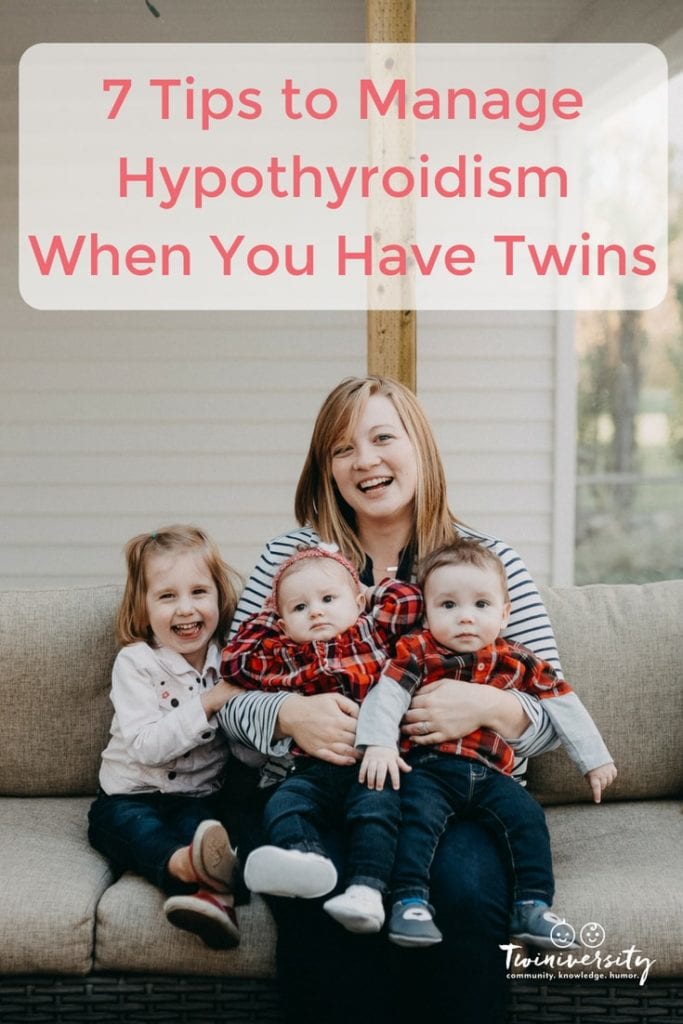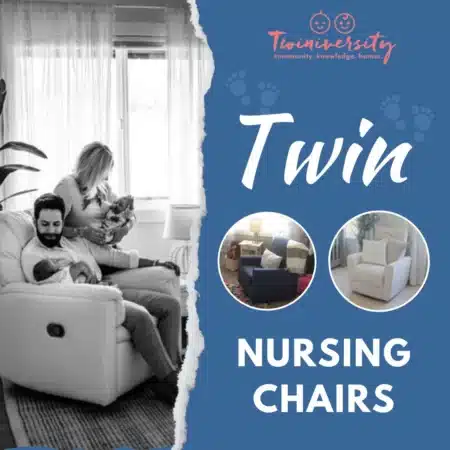Last updated on September 28th, 2021 at 01:44 pm
Raising twins: it’s a wild, busy, amazing ride. Raising twins while dealing with a chronic illness adds a different twist to your story.
My story involves hypothyroidism. I didn’t know anything about hypothyroidism until I had my first child, a singleton. Around nine months after she was born, I felt sluggish, nauseated, forgetful, moody, and exhausted to the bone. I actually thought I might be pregnant and went in to get blood tests for these symptoms. They checked a number of things and said they would call only if something was wrong. I never received a call.
Unfortunately, no news isn’t always good news and I began to think maybe I was just lazy and couldn’t handle this mom thing. Then, I gained 20 pounds in one month and started experiencing a lot of pressure in my head complimented by often seeing sparkles in my vision. I went in to get my eyes checked and asked about the blood tests I had been too tired to check on. As it turned out, my thyroid was not working. “Hypothyroidism” my doctor called it. We didn’t go into any detail about it at that point and he started me on medication for it. He sent me to the optometrist, who sent me to receive a CT scan for my swollen optic nerves.

Thankfully, it was not a brain tumor, which is news that I celebrated with many tears, however, something was still wrong. I was sent to a neurologist and they discovered that I had Idiopathic Intracranial Hypertension. Basically, due to the untreated hypothyroidism and weight gain, the pressure surrounding my brain was too high. The end result of this is the loss of sight. I was very fortunate and was able to stay off medication for it and just lose weight as the thyroid medication took its course, along with monthly checkups to my neurologist.
I kept taking my thyroid medication while pregnant with the twins—it’s especially important to do so while pregnant—and my doctor and I discussed the fact that since my first pregnancy is what caused the hypothyroidism, it was possible this second pregnancy could fix it.
I had my babies in February of this year and three months later I went off my medication, with my doctor’s permission, to test our theory. It takes around three months for the drugs to be completely out of your system and, like clockwork, three months later I gained 19 pounds in just a few weeks. The fatigue came back, the mood swings too, and my hair and eyelashes started to fall out. Blood tests confirmed that the hypothyroidism was still present and I may have to be on medication for the rest of my life.
It’s been about three months since I went back on and I’ve noticed some all-around improvement in my energy levels—though having twins means those levels never get too high. I’m thankful to know that more energy is coming my way as the medication does its job.
Now for all you moms who are going through something similar, here are some things I’ve found very useful to get through your days raising multiples while dealing with hypothyroidism.
*Disclaimer—talk to your Doctor before doing/trying these things.*

1. Blood Tests.
Visit your doctor every few months and get them to test you. If your numbers are off, talk to your doctor about what to adjust so that you can keep things working right. Having a good doctor who knows your medical history can be a huge factor in keeping yourself healthy.
2. Accept Help.
This is good advice for any situation, but you’ll need this to do just about anything on top of taking care of your kiddos. Even on days when you feel like you’re going to be OK, accept offers of help from people you trust. They want to help you and, let’s face it, you could probably use the break.
3. Find a Natural Health Supplement or Vitamin.
When you’re busy raising multiples and trying to get anything else done, you won’t always get your daily-recommended dose of vitamins and minerals. Finding a multi-vitamin or supplement to help you in that area can give your body the boost it needs. I truly believe this is the only reason that I have been able to do what I’ve done up until this point.

4. Exercise.
I know, I know. “When is there time?!” I hear you yelling at the screen. Often, there isn’t time. But when I have the energy, I try to take just fifteen minutes to ride the stationary bike or do a small workout program at home. Getting your body moving—even for a few minutes—can have an enormous effect on your mood and be the difference between a good day and a less-good day.
5. Get Informed.
There are a lot of good places to read information on how to handle hypothyroidism and how to live a full life with it. Whether it’s a medical journal website or a Facebook group for people with hypothyroidism, (ex: Hypothyroid Mom) there is much to be learned from other people’s experiences.
6. Meditation/Relaxation/Counseling.
This will look different for everybody. For me, it’s about mindfulness—spending some time practicing positive thinking, singing, or praying. Whether you do this in the shower (if you had time for a shower that day) or before bed, it can be very life-giving. Your mind needs to stay healthy and dealing with chronic illness can be overwhelming. I recently signed up for counseling and I believe it’s going to be a great outlet for me as an external processor.
7. Transparency.
Be honest. Be open about what you are going through. I’ve been sharing my journey online and with family and friends and the amount of support and encouragement I’ve received has blown me away. I was afraid that people would look at me differently or wouldn’t believe me, but they’ve been nothing but kind and so very helpful. I would encourage you to do the same. We are a community and we are stronger together and when we are honest.

No matter what you’re experiencing or dealing with, try to reach out and surround yourself with encouraging people. If you don’t have family or friends close by, counseling or online support groups can be a great help. You are not alone, and you can get through this. My own personal mantra has both helped me and continually proven to be true; it can’t last forever. There will be bad days, but there will always be good days. You got this, Mama!
All content on this Website, including medical opinion and any other health-related information, is for informational purposes only and should not be considered to be a specific diagnosis or treatment plan for any individual situation. Use of this site and the information contained herein does not create a doctor-patient relationship. Always seek the direct advice of your own doctor in connection with any questions or issues you may have regarding your own health or the health of others.
 Stephanie Peters is a happy, tired 27-year-old wife & mom to a 3-year-old girl and 1-year-old fraternal b/g twins. She lives for her family, honesty, and relatable memes. She loves nachos, singing, and stroking things off lists (i.e. shower?). She’s a procrastinator and an extrovert (who also just wants to be alone & watch Netflix). Keep up with her thoughts & film photos on her blog or Instagram.
Stephanie Peters is a happy, tired 27-year-old wife & mom to a 3-year-old girl and 1-year-old fraternal b/g twins. She lives for her family, honesty, and relatable memes. She loves nachos, singing, and stroking things off lists (i.e. shower?). She’s a procrastinator and an extrovert (who also just wants to be alone & watch Netflix). Keep up with her thoughts & film photos on her blog or Instagram.
Related Articles
Managing Crohns Disease When You Have Twins
Living with MS as a Twin Dad: The Impacts, Fears and How I Deal







